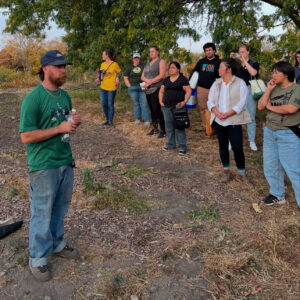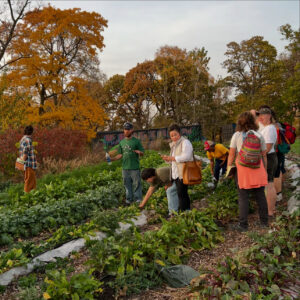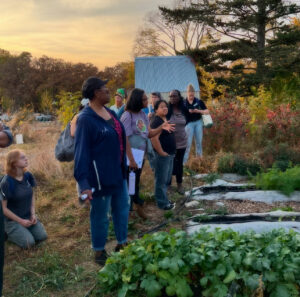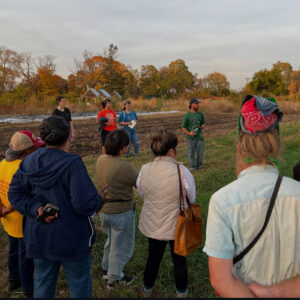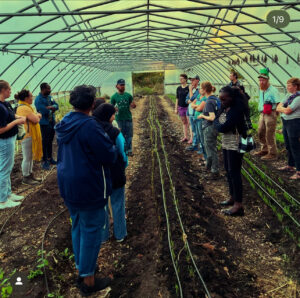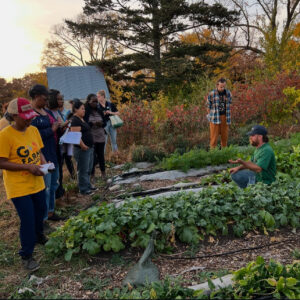Progress report for FNC24-1407
Project Information
Moses B.O Momanyi: moses.b.o.m@gmail.com
Moses co-owns the 20-acre organic certified Dawn2Dusk Farm in Cambridge, Minnesota. Currently he sells vegetables at Mill City & Kingfield farmers markets in Minneapolis and local food hubs. He is president of Kilimo Minnesota, a nonprofit farmer incubator, training 40+ African immigrant farmers in several rented sites across the Twin Cities including Frogtown. He is also president of African Growers and Producers Alliance, an umbrella organization for African farmers. Moses will be the overall team lead related to the research associated with Kilimo Minnesota farmers.
Nura Ahmed: nura5710@gmail.com
Nura is the coordinator for Feeding Frogtown, a non-profit created to support and strengthen families living in the Frogtown neighborhood. Nura has lived in Frogtown for seven years and serves on and volunteers for other neighborhood organizations. Nura also works with the Afrian immigrant farmers associated with Kilimo Minnesota. She will assist Moses in advancing the RootThru experiment with these farmers.
Keanue Driscoll-Cherland: keanue.dc@frogtownfarm.org
Keanue is the Farm Manager at Frogtown Farm, where he has worked for the past 4 years. He leads a team of farm workers in managing all field-based aspects of Frogtown Farm. He will be responsible for the implementation of the experiment throughout its duration. He will also be a central part of the field days associated with the experiment.
Randel D. Hanson, PhD: rhanson2@d.umn.edu
Randy has worked with Frogtown Farms for one year as a consultant to its Farm Manager and other issues as they arise for which his experience is useful. Randy taught agriculture and food systems at Arizona State University for a decade and the University of Minnesota, Duluth, where he founded and directed for a decade the UMD Land Lab, a 30 acre teaching and research-oriented organic farm. He has been active in regional and state community food systems development. Randy will assist in planning and implementation at Frogtown Farm of the experiment and field days.
Sam Wortman, PhD: sam@rootthrugarden.com
Sam serves as CEO of Sage Eco-Innovations, LLC. Sam has MS and PhD degrees in Agronomy and has worked as an agricultural and horticultural researcher, educator, and consultant for over 15 years.
Ignatius Kadoma, PhD: ignatius@rootthrugarden.com
Ignatius serves as CTO for Sage Eco-Innovations, LLC. Ignatius has M.S. and Ph.D. degrees in Chemical Engineering and has nearly 30 years of industry experience in sustainable product development.
Sam and Ignatius will serve as consultants related to experiment design and execution.
Hand weeding vegetables is time
consuming and back-breaking, particularly in narrowly spaced
crops like leafy greens, carrots, and green onions. Many urban
farmers and gardeners have full-time jobs off the farm and tend
their crops in the evenings and on weekends, which makes the
opportunity cost of hand weeding particularly severe. Common
alternatives to hand weeding in these crops include stale seed
bedding, flame weeding, and tillage with harrow and tine weeders;
however, stale seed bedding displaces valuable time in an already
short Minnesota growing season and flame weeding and tillage are
time-sensitive, only partially effective, and can cause
significant crop damage. For most of our crops, mulching is the
most promising option for lasting weed suppression during the
growing season, but traditional plastic mulch films and
geotextile fabrics are not feasible for narrowly spaced crops
because the number of planting holes required compromises the
integrity and function of the barrier. In addition, plastic-based
films and fabrics can contaminate soil and must be removed and
landfilled at the end of their useful life. We need a viable
biobased, mulching strategy to eliminate hand weeding in narrowly
spaced crops on our farms.
Toward the goal of eliminating
hand weeding in narrowly spaced, high density vegetable crops, we
will test the RootThru Weed Barrier in comparison to our current
weed management practices. RootThru is a composite geotextile
fabric made from two sustainable, 100% plant-based materials –
paper and corn. RootThru is unique from other weed barriers
because we can plant our seeds directly on the barrier and the
seedlings grow and root through it; and yet, weed growth is
effectively suppressed below the barrier. Unlike plastic-based
weed barriers, RootThru is biobased and can be taken to a
composting facility after field removal instead of the
landfill.
RootThru is installed by
following these four steps: 1) prepare the soil by removing weeds
and creating furrows for seeds; 2) unroll the weed barrier onto
the soil, form fabric into furrows, and secure the edges with
soil or landscape staples; 3) plant seeds into furrows directly
on the fabric or into a layer of weed-free compost or soil mix;
4) cover seeds with additional compost or soil mix and irrigate
daily until seeds have germinated and rooted through the fabric.
Once established, RootThru eliminates the need for hand weeding
and frees time and energy to create value elsewhere on the
farm.
We received free sample rolls of
RootThru in July 2023 to test at Frogtown Farm and Kilimo
Minnesota Farm in carrot, radish, turnip, sweet corn, jute, and
collard greens. Results were promising and individual growers
were enthusiastic about the product. Nura Ahmed, a long-time
grower at Frogtown Farm said, “I couldn’t believe it, there are
no weeds [in my jute crop] …that is really amazing!” Given the
initial anecdotal success of RootThru, we would like to expand
its use on our farms and quantify the potential benefits for our
farms and share those results with other growers.
In 2024, we will establish field
research and demonstration trials at Frogtown Farm and Kilimo
Minnesota - Lino Lakes Farm to compare the RootThru Weed Barrier
with existing farmer weed management practices (including straw
mulching, hand weeding, and tine weeding). We will use a
mother-baby experimental design whereby there is one controlled,
replicated “mother” trial at Frogtown Farm and at least 3
non-replicated “baby” trials at each farm. Baby trials will be
valuable for providing additional replication of treatments in
the mother trial (additional validation) and for demonstrating
the technology under real-life conditions (thereby improving the
potential for farmer adoption). In the mother trials, RootThru
will be compared to a combination of mechanical and hand weeding
across three replicated, randomized experimental
plots.
At the end of the experiment,
RootThru will be removed from the field and delivered to a
commercial composter, Specialized Environmental Technologies
(SET) in Rosemount, MN. SET will also provide the compost
necessary for the trials, demonstrating the full circularity and
sustainability of the RootThru system (whereby compost produced
from RootThru in one season can be used to grow crops in RootThru
in subsequent seasons).
Data collection plans from these
field trials are summarized in the “Measuring Results” section
below.
Cooperators
- - Producer
- - Producer
- - Producer
- - Producer
- - Producer
- - Producer
Research
We did field research and demonstration trials at Frogtown Farm and Kilimo Minnesota - Lino Lakes Farm to compare the RootThru Weed Barrier with existing farmer weed management practices (including straw mulching, hand weeding, and tine weeding). We used a mother-baby experimental design whereby there is one controlled, replicated “mother” trial at Frogtown Farm and at least 3 non-replicated “baby” trials at each farm. In the mother trials, RootThru was compared to a combination of mechanical and hand weeding across three replicated, randomized experimental plots. Baby trials provided additional replication of treatments in the mother trial (additional validation) and for demonstrated the technology under real-life conditions (thereby improving the potential for farmer adoption).
Results
1: We reduced weed incidents of all types and thus had to use far less labor hours to manage plots.
2. Crop production levels did not significantly change although less time was need to harvest given the lack of weeds.
3. We improved overall profitability of crop production due to less labor hours in managing weeds.
4. Improved quality of life for all farmers involved due to far less intensive needs for managing weeds.
5. In hindsight the use of RootThru improved weed management, stress management of farmers and greatly improved the enjoyment of farming.
Educational & Outreach Activities
Participation Summary:
Across three events, a total of 44 attendees participated in urban agriculture programming at Frogtown Farm. The Go Farm Connect event on October 21 successfully connected local urban farmers and gardeners with resources from Frogtown Farm, USDA, and UMN Extension, while also gathering insights on growers’ needs for future support.
In addition, Keanue Driscoll-Cherland led two hands-on workshops focused on RootThru installation, engaging both local farmers and youth. Community outreach through social media and local networks contributed to strong participation across all events.
These events effectively increased awareness of urban agriculture opportunities and provided practical skills, laying the groundwork for expanded support and programming in the coming season.
Learning Outcomes
Lessons Learned from the RootThru Weed Barrier Project
Effectiveness in Weed Suppression – RootThru successfully suppressed
weeds in narrowly spaced vegetable crops, as evidenced by growers'
enthusiasm and anecdotal success, reducing the labor-intensive burden
of hand weeding.
Ease of Adoption and Application – The four-step installation process
was straightforward, making it feasible for farmers to integrate
RootThru into their existing practices without specialized training.
However, ensuring proper soil preparation and irrigation was key to
success.
Sustainability and End-of-Life Management – Unlike plastic-based
alternatives, RootThru’s biobased composition allowed it to be
composted at a commercial facility, closing the sustainability loop.
However, access to composting facilities may limit large-scale
adoption in certain regions.
Crop Compatibility and Growth Performance – Initial trials showed
promising results for crops like jute and collard greens, but further
research is needed to evaluate long-term performance across different
soil types and climates.
Scalability and Cost Considerations – While RootThru showed strong
potential, cost-effectiveness compared to traditional methods (hand
weeding, straw mulch) remains to be quantified. Future trials will
need to assess economic viability for widespread adoption.
Experimental Design for Broader Validation – The mother-baby trial
approach was valuable for both controlled testing and real-world
demonstrations, enhancing credibility and farmer buy-in. However,
additional replicated trials would further validate findings.
